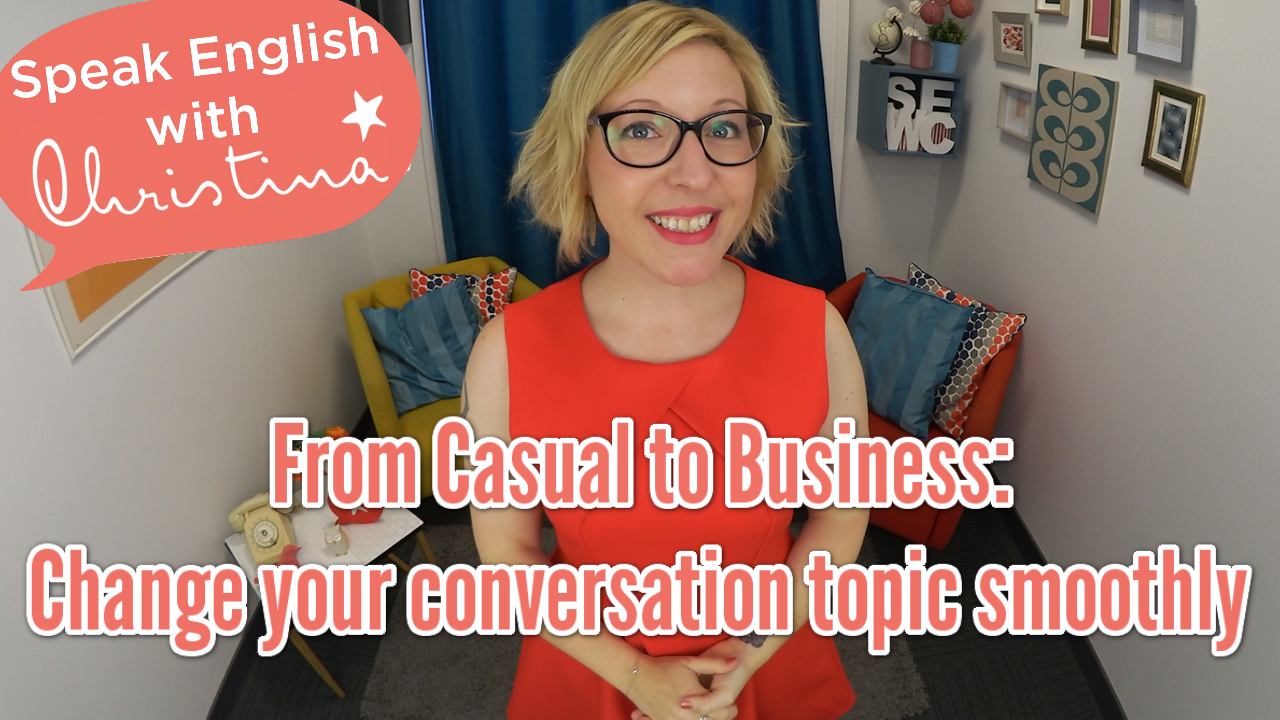
Small talk often moves between personal and professional topics. You need to be able to talk casually about business, and to transition smoothly between subjects. Don’t worry! We have some common vocabulary you can use in this situation, and a lot of typical expressions you can learn right now.
Hi there! I’m your English coach Christina, welcome to Speak English with Christina, where you’ll learn American culture and business know-how to become confident in English.
Let’s learn some practical conversation transitions, useful words to talk about business, and how you can answer the very common question in American small talk: How’s business going?
To expand your vocabulary, get cultural insights, and become truly comfortable in everyday small talk conversations in English, this is the final week to join my course Successful Small Talk. You get much more in-depth advice, lessons and exercises to practice small talk. But we close registrations on Friday October 26, 2018. The link to join is below this video. Now, on to conversation strategies!
Use Conversational transition phrases
Transitions are very useful. You can move the conversation forward naturally, and you will sound more socially fluent when you can change subjects smoothly.
For example, here are two transitions: So, anyway… and By the way…
We use them to introduce a very different topic in a conversation. They help transition smoothly between subjects without breaking the conversation flow, or or revive a conversation that fell silent.
For instance, if you’ve been talking about good restaurants with a colleague, and the conversation begins to slow, you can always say something like:
“So, anyway, what are your plans for the weekend?”
Or “By the way, did you hear about the news in the admin department?”
Other transitions that can help you are: That reminds me… and Speaking of…They introduce a related subject.
Again, if you’ve been talking about restaurants and the conversation begins to die, you can say:
“That reminds me, for lunch, why don’t we go out to that Ethiopian place down the street? My treat.”
Or “Speaking of dinner, I wanted to ask: How was your dinner last night with Michael?”
These phrases can make your conversation sound a lot more fluent and natural!
Useful Collocations for Business
What are collocations? They’re words that go together often. Like chunks, they can increase your fluency. A few of them can be especially useful for business-related small talk.
For example “look into”. It’s a phrasal verb which means “to explore the possibility” or “to investigate” something. For example, I might look into changing jobs.
Notice the -ing ending after “look into”. You can also look into hiring new people, or look into organizing a visit, etc.
Another useful phrasal verb is : “To set up”
It means “to create; to establish; or to plan”.
For instance, you can set up a meeting with the client, you plan it. You can also set up a process, or a new strategy. You’re creating a new way of doing something, and that’s quite common in business.
Other collocations you might need in the business words are To go on strike – to stop working as a protest, or To lay off someone – to terminate their contract because there’s not enough money or work to keep that job open. To be fired, is like being laid off, but it’s more personal, like if you’ve made a serious mistake.
For instance:
They’re laying off 10% of the admin department. The union is considering to go on strike. I think the company should just fire the boss.
I know that there are big differences in French and American cultures on these topics. It can be a conversation topic for your small talk! Comparing cultures is always a fun discussion!
How’s business doing?
In a previous episode, we learned that “How’s business doing?” is a very common question, and that Americans may even ask about the number of clients, your sales, and other information about the success of your company.
You can answer “OK” or “Good”, sure, but there are other, more nuances answers you can give that will make you sound more fluent and natural!
For example, in the best situations, you can answer “Better than we expected”, or “Really good actually.” If business is OK, you can use “It’s pretty good” or “It’s picking up.” Or even “Same old, same old” if it’s business as usual. For bad situations finally, you can try “Not so good, I’m afraid”, or “We’re hanging in there”, which means you’re basically surviving.
Your turn now! Tell me, how’s business doing? Write your answer in the comments below!
If you dare, you can also give us a small-talk sentence with a transition and a collocation!
Successful Small Talk COURSE
This is your last chance to get to expand your vocabulary, get all the in-depth advice, lessons and exercises to become comfortable in everyday conversations included in my course Successful Small Talk. We close the doors on Friday October 26, 2018, so if you’re tired of feeling blocked in conversations because you lack vocabulary, click the image below. Thanks for watching, and I’ll see you next week!

More good stuff...
Click the image to learn more








By the way, I’m looking into participating in the new course “Understanding IELST”.
I’m sorry for my mistake. The course is called “Understanding IELTS”.